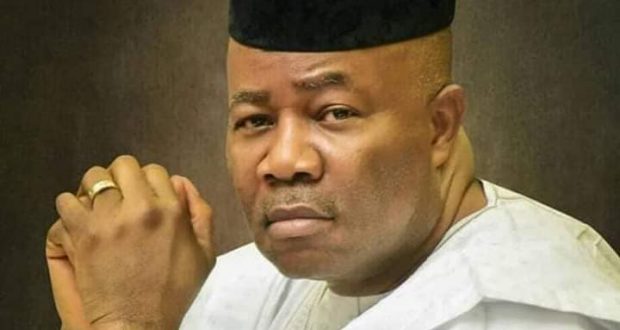By Joe Iniodu
Immediately after subscribing to the constitutional Oath of Office and Oath of Allegiance on May 29, 2007, the elated and enthusiastic new governor in a velvet voice thundered during his inaugural address: “This is Godswill Akpabio reporting for duty”. The import of that statement tended to imply that there would be a scorecard to assess his performance. More than that, he knew he would be judged by the quality of service delivery, not rhetoric and propaganda. So Akpabio from day one rolled up his sleeves and set to work. In the first term, Akwa Ibom began to feel the impact of his government. With confounding zeal, he launched into many facets, seeking to make a difference in the lives of Akwa Ibom people within the shortest possible time. He also reckoned that road infrastructure which was in dire strait and an inventive transport policy could jump start the local economy through empowerment of people with commercial transport vehicles like cars and buses.
A transport policy has a critical role to play in any economy. It involves the planning, preparation and implementation of actions designed to address the movement of persons, goods and services including the allocation of transport resources. Of course, it also involves the management and regulation of existing transportation activities. Transport policy covers land, air and sea. But we would constrict this treatise to land, and examine what Akpabio did differently in the transport sector to merit a resurgence of fond memories of the era by transporters many years after his exit as governor.
The transport policy of the Akpabio administration was beneficial to many. Some of the beneficiaries included about 14, 000 civil servants in the State who were provided with buses to convey them to and from work from their various local government areas to Uyo at highly subsidized cost. The buses, some of them luxury, were donated to the civil service and assigned the purpose of conveying civil servants.
The Akpabio administration purchased several pieces of brand new FORD FOCUS saloon cars and distributed them to Akwa Ibom transporters upon meeting some minimal and flexible conditions. Many transporters, who leveraged on that particular policy, were able to access brand new vehicles for their transportation business. Land transportation was boosted and made easy in the State, as the taxi cabs called Ibom Taxi offered decent and efficient services, especially in car hiring.
There were also large numbers of brand new TOYOTA HIACE buses which were injected into the transport sector to mop up the growing deluge of commuters on various local government routes intending to access Uyo Capital City. Just like the case of the saloon cars, the buses were also given to transporters who met the set conditions. It was easy to see Okada riders then, graduate from owning motorcycles to proud owners of brand new American FORD FOCUS or brand new TOYOTA HIACE bus. Many of those vehicles still ply our roads till date.
The policy also attempted inters- local government bus services with Uyo as the destination, using luxury buses. The cost was affordable with assurance of comfort. But perhaps owing to government’s direct involvement in the management of that process, success rate was low. It is a founded fact that public attitude to government investment or services is dismal. It is why the slogan “government has no business doing business” has gained such currency that it is considered valid. And so we often witness good intentions of government policy suffer hemorrhage because many see shortchanging government as their opportunity of accessing their share of the cake.
How that particular aspect of inter-city bus service fared may not be recorded as an economic success story. But one cannot take away the good intention, the determination to bring succour to commuters and make movement of goods and services available at affordable cost. After-all, the essence of government as they say, is to ameliorate the pains of the citizenry.
One can say without equivocation that government’s intervention brought decorum and decency to the transport sector. Akwa Ibom people recall with nostalgia the change that attended the transportation landscape. The glittering brand new vehicles that plied the roads, the courteous services that were offered, the empowerment that was spawned and other value chain that came with that scheme, are still things we remember with glee. It was a scheme that put food on many tables and serviced a plethora of existential needs.
Yours truly recalls with exultant cheer, my many visits to Akwa Ibom State from my abode then where I had held a long sojourn. It was cheering to have the optimism of finding a decent taxi cab to hire anytime one was in the State. This experience made the state contemporary and a ready allure for visitors. One wishes such a scheme was sustained with an efficient mechanism put in place to recoup the investment, while making it revolving. The scheme may not have had a 100% success rate but suffice it to say that it served a purpose and solved myriads of problems.
Today, getting a decent car hire within any of our towns is a herculean task. Apart from the airport and some hospitality facilities which offer such services, decent taxi cabs are not readily available on our roads for such services. Even what is available in other metropolis and popularly known as “kabukabu” are not in Akwa Ibom. People make a living plying “kabukabu” but here, our people prefer to drive to the homes of politicians and wait endlessly for pittance that may not even come or comes with a rape of one’s dignity. It is time for government to take another keen look at the transport sector and support its reinvigoration as a way of empowering the people. It is also time for the people to look at the viability of the sector and take advantage of it by becoming participants and stakeholders. As Abraham Lincoln noted in a letter to his son’s teacher: “A penny earned is better than a dollar given”.
Joe Iniodu is a public analyst
 Newsfront Online …Telling the Public as it is
Newsfront Online …Telling the Public as it is




